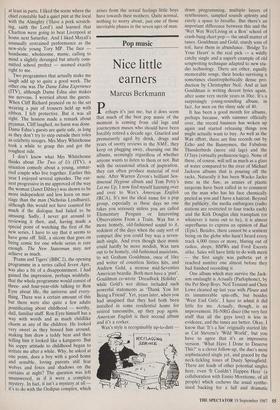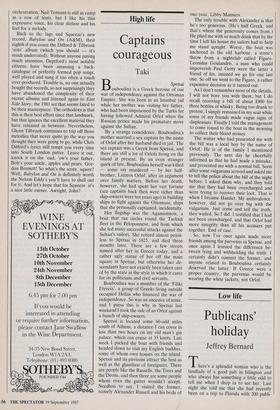Pop music
Nice little earners
Marcus Berkmann
Perhaps it's just me, but it does seem that much of the best pop music of the moment is coming from old lags and journeymen musos who should have been forcibly retired a decade ago. Gnarled and prematurely aged by drink, drugs and years of snotty reviews in the NME, they keep on plugging away, churning out the albums, seemingly regardless of whether anyone wants to listen to them or not. But with the occasional attack of inspiration, they can often produce material of real note. After Warren Zevon's brilliant Sen- timental Hygiene album and Tom Petty's Let me Up, I now find myself listening over and over to Wax's American English (RCA). It's not the ideal name for a pop group, especially as these days no one takes you seriously unless you are called Elementary Penguin or Interesting Observations From a Train. Wax has a more homely, old-fashioned sound to it, redolent of the days when the only sort of compact disc you could buy was a seven- inch single. And even though their music could hardly be more modish, Wax turn out to be homely, old-fashioned musicians, to wit Graham Gouldman, once of lOcc and writer of countless Sixties hits, and Andrew Gold, a morose mid-Seventies American beardie. Both men have a 'past'. Gouldman co-wrote `Dreadlock Holiday', while Gold's wet ditties included such powerful statements as 'Thank You for Being a Friend'. Yet, years later, when you had imagined that they had both been installed in some residential • home for retired tunesmiths, up they pop again. American English is their second album and it's a corker.
Wax's style is recognisably up-to-date — drum programming, multiple layers of synthesisers, sampled sounds aplenty and rarely a space to breathe. But there's an important difference between this and the `Wet Wet Wet/Living in a Box' school of crash-bang chart pop — the small matter of tunes. Gouldman and Gold, sturdy sons of toil, have them in abundance. 'Bridge To Your Heart' is the real pick — a wildly catchy single and a superb example of old songwriting technique adapted to new stu- dio technology. There are other, equally memorable songs, their hooks surviving a sometimes claustrophobically dense pro- duction by Christopher Neil. And at last Gouldman is writing decent lyrics again, after some very sterile years in 10cc. It's a surprisingly young-sounding album, in fact, for men on the shiny side of 40.
It has been a good month for albums, perhaps because, with summer officially over, the record business has woken up again and started releasing things you might actually want to buy. As well as the Wax effort, there are fine records out by Echo and the Bunnymen, the Fabulous Thunderbirds (more old lags) and the O'Jays (virtually prehistoric•lags). None of these, of course, will sell as much as a glass of water compared to the river of Michael Jackson albums that is pouring off the racks. Naturally it has been Wacko Jacko time in the Sun, as armies of plastic surgeons have been called in to comment on the man who has his face chemically peeled as you and I have a haircut. Beyond the publicity, the media embargoes (radio stations are restricted to four tracks each) and the Kirk Douglas chin transplant (or whatever it turns out to be), it is almost superfluous to express an opinion of Bad (Epic). Besides, there cannot be a sentient being on the globe who hasn't heard every track 4,000 times or more, blaring out of radios, shops, BMWs and Ford Escorts alike. Sales will have little to do with merit — the first single was pathetic yet it reached number one almost before they had finished recording it.
One album which may survive the Jack- son onslaught is Actually (Parlophone), by the Pet Shop Boys. Neil Tennant and Chris Lowe cleaned up last year with Please and its innumerable spin-offs, but besides `West End Girls', I have to admit it did little for me. Actually, though, is an improvement. Hi-NRG disco (the very fast stuff that all the gays love) is less in evidence, and the tunes are better. Okay, I know that 'It's a Sin' originally started life as Cat Stevens's 'Wild World', but you have to agree that it's an impressive version. 'What Have I Done to Deserve This?' is a clever follow-up, the duo's most sophisticated single yet, and graced by the neck-tickling tones of Dusty Springfield. There are loads of other potential singles here, even 'It Couldn't Happen Here' (a collaboration with Ennio Morricone, of all people) which eschews the usual synthe- sised backing for a full and dramatic orchestration. Neil Tennant is still as camp as a row of tents, but I like his thin expressive voice, his clear diction and his feel for a melody.
Back to the lags and Squeeze's new record, Babylon and On (A&M), their eighth if you count the Difford & Tilbrook `solo' album (which you should — it's much underrated). Without anyone paying much attention, Deptford's most notable citizens have been amassing a back- catalogue of perfectly formed pop songs, well played and sung if too often a touch over-produced. Trouble is, no one actually bought the records, so not surprisingly they have abandoned the complexity of their recent albums and listened again to East Side Story, the 1981 set that seems fated to be their masterpiece. The orthodoxy is that this is their best effort since that landmark, but that ignores the excellent material they have released in between. Nevertheless, Glenn Tilbrook continues to trip off those melodies that never quite go the way you thought they were going to go, while Chris Difford's lyrics still tempt you every time into South London patter. Leave it out, knock it on the 'ead, 'ow's your father, Bob's your uncle, apples and pears. Gor- don Bennett! So what's the score, squire? Well, Babylon and On is definitely worth the Nelson Eddy's you'll have to shell out for it. And let's hope that for Squeeze it's a nice little earner. Awright, John?



































































 Previous page
Previous page